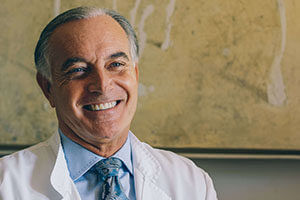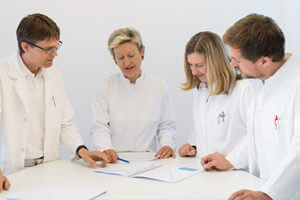LONGEVITY
Longevity: Strategies for a long, healthy life
Who doesn’t dream of living to a ripe old age in the best of health, and being able to do whatever they want at 80, 90 or even 100? Since ancient times, people have searched for the source of everlasting youth, a potion or fountain of youth that would make them immortal, or at least give them a long life free from the suffering and inconveniences of growing old. Scientists of various disciplines are also increasingly interested in the topic of longevity and finding out what it is that determines how people age and how long they live. Is it mainly our genes, certain environmental factors, or can we all actively contribute towards achieving a long and healthy life?
At Buchinger Wilhelmi, we consider fasting to be the most efficient non-pharmacological approach to treat diseases, prevent their development, and increase life expectancy. In our opinion, a healthy lifestyle should be the result of daily activities based on six pillars of health. We also introduce our new diagnostics offering in connection with this, including tests that allow us to personalise our therapies according to your gut microbiota profile or genetics.
Longevity – What is it exactly?
The term longevity is derived from the Latin words “longus” (long) and “vita” (life), and refers not only to the length of life, but also its quality: It is about ageing as healthily and slowly as possible while reducing the risk of certain diseases that occur more frequently with age, such as obesity, cardiovascular disease, musculoskeletal disorders, cancer and dementia. Because these diseases and their consequences not only affect people’s well-being, but can also have social and economic repercussions, particularly in ageing societies, longevity has become a growing international and interdisciplinary field of research.
Why do we age?
Ageing is a biological process that begins at birth and ends at death. The changes it brings about in the body have both external and internal causes.
For example, we are genetically programmed to reach our peak level of fitness between the second and third decade of life – the period in which we reproduce and care for our offspring. After that, the real ageing process begins, defined by scientists as a “progressive loss of physiological integrity”.
- Cell division decelerates, reducing the regenerative capacity of the organs
- Errors that occur when the genetic material is copied during cell division can no longer be fully eliminated and are passed on
- As the immune system loses some of its defensive capacity, we become more susceptible to infections
- In addition, more pro-inflammatory markers are released as we get older, which can lead to mild but chronic inflammation. This so-called ” inflammageing” further accelerates the ageing process.
How we can actively contribute to staying healthy and fit into old age
The good news is, we are by no means completely at the mercy of our genes. According to scientific research, only 10 to 15 percent of a person’s life expectancy can be attributed to genetic factors. This means that our lifestyle and the environment in which we live have a much greater influence on the ageing process than our genetic make-up.
One good example of this can be seen in so-called Blue Zones – regions around the world where people not only grow to be exceptionally old but are also less likely to suffer from cardiovascular diseases, cancer or diabetes. They include Sardinia in Italy and Okinawa in Japan. What all five Blue Zones have in common is that their residents eat a predominantly plant-based diet, rarely smoke and/or drink alcohol and cultivate social contacts. Physical work and sports also play an important role in their everyday lives.
There is sufficient scientific evidence that our diet in particular plays a major role in our health and therefore also the ageing process. Our Western diet comprising lots of red meat, sugar, refined grains and bad fats, but little fruit, vegetables and pulses has been shown to lead to an increase in so-called lifestyle diseases such as type II diabetes. It also damages the intestinal microbiome, which is so important for our health, and triggers the “inflammageing” process mentioned above. Sugar in particular is responsible for many inflammatory processes in the body. Moreover, the constant availability of an abundance of highly processed convenience foods not only tempts us to eat all the time, but also means that we ingest many harmful additives such as artificial flavours, colours and preservatives.
People who spend their leisure time on the sofa watching television, on their computer or smartphone have an even greater risk of suffering from these lifestyle diseases.
But we can flip the switch whenever we want – for example, by starting to eat more healthily, giving our bodies a break from food, exercising more and spending our free time doing fulfilling, maybe even communal activities. Our scientific team has written an article about it. Read it here!
Eat healthily
A healthy diet consists primarily of plant-based, unprocessed foods that are packed with vitamins, phytochemicals and fibre. Pulses are particularly rich in protein and are therefore an excellent and healthy alternative to meat; nuts, vegetables, wholegrain cereals and healthy oils and fats provide us with complex carbohydrates, protein and essential fatty acids. If possible, you should avoid sweetened (ready-to-drink) beverages such as soft drinks. It is particularly important to refrain from drinking alcohol and smoking as far as possible, as they promote inflammation and cause cells to age more quickly.
A healthy diet creates a sense of well-being, gives you an energy boost and puts you in a good mood – psychological factors that also contribute to good health in old age.
Our team of doctors and nutritionists have developed guidelines including nutritional advice, and our head chef has written a cookbook packed with healthy, delicious recipes, “A pleasure a day”, which can be ordered here.

Fast regularly
Regularly abstaining from food – whether in the form of long-term or intermittent fasting – has been scientifically proven to improve your health in the long term and reduce the risk of developing lifestyle diseases such as type II diabetes and cardiovascular diseases. Fasting triggers repair mechanisms in the body at a cellular level which help to break down, recycle or eliminate faulty and damaged cell structures. The scientific term for this is “autophagy”. Our research programme shows that long-term fasting has beneficial effects on risks factors for cardiovascular diseases, insulin sensitivity, and well-being, and could even have antiaging effects.
Do more exercise
Exercise is one of the most important factors for a long, healthy life. People who exercise regularly have lower stress levels and a reduced risk of cardiovascular disease, type II diabetes and even cancer. Inflammatory reactions that accelerate the ageing process are inhibited. Exercise also prevents the loss of muscle mass, maintains mobility, improves the capacity of the lungs, and has a positive effect on our mental health.
Thirty minutes of moderate exercise five days a week, or 150 minutes a week, is recommended. Walking more often, taking the stairs instead of the lift, and cycling instead of driving are good ways to achieve this. Moderate strength training is also recommended for stronger muscles.
Take a look at our Buchinger Wilhelmi sports playlist, in which our experts give simple training tips.

Sleep well
If you want to live long and stay healthy, make sure you get enough sleep. Because sleep also plays a major role in cell regeneration, removing waste products and modulating the energy metabolism. Having a good night’s sleep stimulates the body’s self-healing powers and can even prevent neurodegenerative diseases. Chronic sleep deprivation, on the other hand, not only has a negative impact on our mental and physical performance but is also associated with a number of health issues. In our clinics, we provide a sleeping kit with a sleep mask, earplugs and lavender spray to make sure you get the best possible sleep.
Maintain an emotional balance
An emotional balance is crucial for our overall well-being. It reduces stress, boosts the immune system, and enhances our mental clarity. To maintain it, you should practice self-awareness, exercise regularly, cultivate healthy relationships, practice mindfulness and relaxation techniques and seek support when needed.
Avoid toxic chemicals
Protection from chemical pollution is crucial for our health. Exposure to harmful chemicals can lead to various health issues, including respiratory problems, cancer, and reproductive disorders. Some chemical pollutants are even recognised as “gerontogens” that can accelerate aging.
To minimize exposure, you should
- prioritize using natural cleaning products
- avoid pesticides
- opt for organic foods
- properly dispose of hazardous waste
- ventilate the indoor spaces regularly
Video about the topic “The 6 pillars of health”
In conclusion, the six pillars of health can be seen as efficient non-pharmacological approaches for a healthy, long life:
- nutrition
- fasting
- emotional balance
- physical activity
- environmental quality
- sleep
Longevity has always been important at Buchinger Wilhelmi
At Buchinger Wilhelmi, we want to empower people to activate their self-healing powers through fasting, exercising and changing their lifestyle for the better with the aim of achieving a long, healthy life.
For this reason, we not only share our expertise (you can find lots of useful tips and information on our YouTube channel), but also offer you the chance to devote yourself fully to your health and maximise the benefits of fasting at one of our clinics. Our FASTING BOX is also available for a five-day metabolic reset at home.
FOR HIGHLY PERSONALISED THERAPY
Our new diagnostic tests
In the pursuit of a long and healthy life, it is crucial to recognize that longevity is also a matter of conscious prevention. This is why we have introduced new longevity diagnostic tests to complement our comprehensive range of diagnostic instruments in our clinics with the aim of preventing chronic illnesses and supporting treatment.









